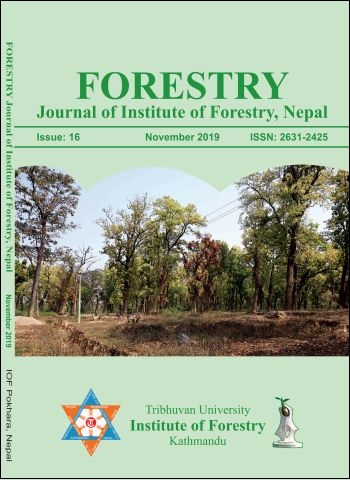Residents' Attitudes towards the Residential Urban Forest in Metropolitan City: A Case Study from Bharatpur City in Nepal
DOI:
https://doi.org/10.3126/forestry.v16i0.28360Keywords:
Urbanization, negative effects, positive effects of trees, cognitive intention, environmental valuesAbstract
Urban forests are critical element in ameliorating urban habitats and building sustainable cities. Local residents are the key players in maintaining greenery of the city as they collectively own majority of land in most cities. Therefore, they need to engage in planting and retaining trees on their properties in order to reach canopy cover in urban areas. The project surveyed 200 local residents in Bharatpur Metropolitan City to examine their attitude towards trees on their property on the basis of 'Affective', 'Behavioral' and 'Cognitive' ABC model of attitude. Results show that majority of the residents have positive attitude towards trees as they have high cognitive intention towards trees, and showed willingness to retain the existing trees and add more in future. However, very few are cognizant of the environmental values of trees. The most common positive effects of trees on their property are food, shade, and clean and fresh air. The most common negative effects are increase in bushes and weeds, wildlife hazards and risk of fall due to wind. Urban planners interested in influencing residents' decisions about urban trees need to work on public outreach. Residents need to be motivated and made aware of the long term and multifunctional benefits of trees for retaining the existing trees and planting more in their property. They should also, be made aware of the type of trees that are suitable for plantation on residential property in order to avoid the problems that can be created due to trees.
Downloads
Downloads
Published
How to Cite
Issue
Section
License
This license enables reusers to distribute, remix, adapt, and build upon the material in any medium or format, so long as attribution is given to the creator. The license allows for commercial use.




